- Home
- Jessie Haas
Westminster West Page 4
Westminster West Read online
Page 4
Bong! said the clock. One-thirty. Sue couldn’t remember that she’d ever stayed up this late. The house was a shell of silence within the noisy, raining night, and her eyes were wide open. She felt as if she might never sleep again.
6
“GOODNESS, CHILD, you look like death warmed over!”
Mother’s eyes were piercing, even early in the morning. Sue turned away to grind the coffee. She had slept a little. Two-thirty the clock had chimed, and she didn’t remember three. Now it was six o’clock, perfectly light out, Henry coming to the door with milk pails, bacon in the pan. Every time footsteps sounded at the door, Sue looked to see if it was Father. She felt as if she’d never seen him in her life.
“… somebody who’s a farmer!” Henry again, bringing the last milk pails. “Hasn’t anything burned since winter, has it? It’s somebody that’s too cussed busy, come spring, to do anything but work. Give him a minute’s breather, and he’ll be at it again!”
“Barns do burn, Henry, without anybody setting fire to them.” That was Ed, pausing at the door to pry off his boots before he carried his two pails to the pantry. Henry handed his pails to Sue. Their weight stretched her shoulders—into the pantry, where Ed lifted them into the spring box.
“Quick’s we get that corn cultivated—” Father’s voice. Heat flooded Sue’s face. It was like the time she had walked in on him bathing and seen him naked. He didn’t know about that, either.… She turned and peeked out the pantry door.
He looked exactly as he always did. He looked like Father.
Sue blinked hard. Her eyes were dry this morning, but it was more than that; a pattern intervened and kept her from really seeing. A set of knowledge told her: This is Father. He’s eager to start mowing, thinks Henry is funny talking about the fires again, likes the smell of bacon, will sit down, yes, and rub his hands together in the eager way that means he’s in a happy frame of mind.…
Does it?
Father seemed so simple on the surface, but that wasn’t true. His correct, dutiful, matter-of-fact responses to life—so staunch, so Father-like—were not Father. Not all of him.
When had he started to like his life again? Did he like his life? Did Westminster West become big enough to contain the boy who had seen a war?
“Sue?” Mother paused in her quick stepping around to lay her wrist against Sue’s forehead. “No fever. Goodness, child, brisk up! You’re as bad as Clare this morning!”
The morning passed in a haze—a real haze, as the hot sun cooked the juices out of the earth, and an inner haze, which seemed to come between Sue’s eyes and her understanding. Even her busy hands, which picked currants until her fingers were red and stinging from the juice, which stemmed the currants, bagged them in cheesecloth, stirred them into brilliant red jelly on the stove in the summer kitchen, and squeezed the last juice out of the bag, seemed far away and not connected to her mind.
Dinner. It was impossible, after all, to look at Father. She would glance up, see the shape of his long nose and the crosshatched lines beside his eyes and then away, knowing nothing more than before.
Listening was easier, but how little Father said! Sue kept needing to glance up to see what he was thinking, and the hot, miserable blush would rise. I don’t like this, she thought, bending low over her plate. She would put the book back. She would never think about it again—
“I need a chicken killed for Sunday dinner,” Mother remarked. “And Henry, could you mend this table before you go back out? The leaf is sagging terribly.”
“All right,” Henry said.
Ed made a face. “Then I’ll have to do in the bird. Unless you will, Captain?” He made his mouth innocent, but his eyes teased.
Father’s silence seemed to deepen, and Mother cast Ed a warning look. Father never butchered anything. Mother killed the hens if neither boy was around, or sometimes Sue did. When a hog or sheep was butchered, George Corey came to do it, and Father left for the day. Sue had never wondered why. That was just Father. Now she could think of reasons.
Ed said, “Okay. Point out your victim, Mother dear, and she’ll go to the block!”
“Thank you, Ed. Then Sue can pluck and draw the bird while I—”
“Mother,” Clare said, “do we have to talk about this at the dinner table?”
At the same instant Sue found herself saying, “Mother, may I do the pies instead?”
Mother looked bewildered for an instant, attention divided between Sue and Clare. It was Sue she settled on this time. “You mustn’t let yourself start to get squeamish, Sue. These jobs have to be done.”
The word squeamish was almost Sue’s undoing. It brought to mind the warmth of the innards, the heavy smell. Her stomach nearly heaved. That must be the smell of the battlefield, too.
Mother eyed her sharply. “All right. This time you may do the pies.”
As they washed dishes, Sue tried not to hear the squawk of the captured hen, the thunk of the ax striking the chopping block, and the scuffle as the hen’s body struggled in the grass with no head. Clare avoided the sounds easily, sitting in the rocker with her fingers in her ears. Far down the field the scratch of the cultivator would drown the sound for Father.
“Hey, Sue!” Henry called. “Will you look at the level?”
The spirit level, a polished length of hardwood with brass ends, lay across from table to leaf. Sue looked at the glass tube embedded in one long edge. A bubble floated in yellow liquid, and when the bubble settled between two lines on the tube, the table was level. “Not yet,” she said.
Henry added a shim. Sue watched the bubble tremble and drift. Something seemed adrift inside her, too, and the tremor of the spirit level set up a sympathetic tremor in her stomach. She almost felt sick.
7
SUE READ THE DIARY twice through that night. On Sunday morning her eyes prickled with tiredness. The light seemed too much for them, and when she had strained her corset shut, it squeezed her so tightly she could barely breathe. She blinked hard to chase the black dots from her vision, finished dressing, and went downstairs to the hot kitchen.
Father changed his clothes and showed himself to Mother. “Neat and respectable, Jane?”
It was Westminster West’s Sunday joke. Reverend Stevens had once presented himself to his wife for before-church inspection. Sue could picture Mrs. Stevens looking at him in that bland, complacent way that masked her sense of fun.
“Your coat, your collar, and necktie look very nice and neat. But, Alfred, you would look much neater and more respectable if you wore a pair of trousers!”
The same joke every Sunday. The same seats in the wagon, same journey, same road. Just past the corner of Westminster West road, the same call from behind.
“Hello there, Gorhams. I need to pass.”
That was Deacon Buxton— “poor Buxton,” who’d been a prisoner at Andersonville—driving his wife and two children behind a thin team. Father firmed his hands on the reins as the deacon passed. Bright and Lucky were apt to think it was a race.
After Deacon Buxton came the Millers, late in starting and driving fast to make up for it, their five boys and two girls piled in the spring wagon. Bright and Lucky swelled their necks, asking for more rein. Father let the leather slide through his hands, and Sue felt the surge of power in the wagon. Of course it was not a race, but though they were the best of friends, Father never did like to let Reuben Miller pass him.
A Sunday like every other.
But Sue felt a doubleness, another Sunday shadowing this one. Father had set out on this same road, with new-blacked boots and dread in his heart, past the same landmarks in the same wagon, behind old Queen, who was Bright and Lucky’s granddam. If some magic had given Sue the ability to see both Sunday journeys at once, it would be like a stereoscope: two flat pictures, nearly identical, jumping into three-dimensionality.
At church Ed went up the aisle with Mother on his arm. Sue and Clare followed, side by side. Sun streamed through the tall windows, across
the assembled bonnets and bowed gray heads, the worn coats, the shiny black of good Sunday dresses. The pattern blurred past Sue’s eyes, making her slightly dizzy. She was grateful to sink onto the wooden seat of the Gorham pew, as familiar and homelike as any room in their house.
Ed took his place with the singers, Father and Henry came in from stabling the horses, and Reverend Stevens advanced to the pulpit. Voices were lifted in song, Ed’s rich baritone underlying, leading, and supporting.
Then Reverend Stevens opened his sermon and embarked on his leisurely course, its firstlys, secondlys, and thirdlys providing the Sunday rhythm that had been the same for more than forty years. Flies droned. Fans rustled. A sudden scent of horehound betrayed some worried cougher.
He never mentions the war, Sue realized. Not even in his fortieth anniversary address last year, when he’d listed where each person sat on the morning of his first sermon. Once he’d been passionate about the war. Now he was as silent on the subject as he was about his three dead wives. The war’s wreckage was before him: Otis Buxton, too thin to look at; George Harlow, who wept at certain songs; Father. And Tolman Coombs, now dead, who had always seemed so watchful and so completely passive. But thoughts, everyone’s thoughts, are hidden, and Alfred Stevens concealed his perfectly behind his firm, plain, manly face.
Afterward, in the churchyard, everyone began to speak at once, softly at first, then louder, to be heard above the rising voices. Sue paused on the steps, trying to breathe against the press of her corset, trying to see through the brightness. Coats, white shirts crossed by suspenders, black satin stretched shiny across stiff waists and swirled like patterns in a kaleidoscope.
Faces—Ranney, Gorham, Harlow, Goodell—smiled, turned, smiled again. Only a few faces didn’t seem to fit: young men who were farm workers and came from somewhere else. Alonzo Codding and Charlie West each had a round-cheeked look, a hat-on-the-back-of-the-head look, even on Sunday.
Julia Campbell swished past Sue, leaving a heavy perfume on the air. The sunlight glinted in her golden ringlets, and suddenly Clare appeared at her side. “Julia! We’re working on my traveling dress now! Are you ready?”
“Oh, I suppose so,” Julia answered carelessly, scanning the crowd.
Clare turned to look, too, leaving Sue a view of their hats—songbird’s wings on Julia’s, velvet and false pearls on Clare’s. “I know,” Clare said. “Isn’t fitting a bore? But soon we’ll be away—”
“Susan, dear, come over into the shade.” A soft, smooth hand closed over Sue’s. Delyra Goodhue’s pretty, faded face smiled up at her.
“I know just how you feel,” Mrs. Goodhue said, guiding Sue gently down the steps. In a moment they were free of the crowd, standing apart under the shade of the elms. It was flattering to be noticed by Delyra Goodhue. It was Westminster West’s famous romance. Homer Goodhue had left to make his fortune, and for twenty-three years Delyra Tuthill waited for him. By the time he returned she was an invalid, but the wedding went forward, and there could be no doubt of their happiness.
“Here, dear.” Delyra fumbled in her bag and handed Sue a peppermint. “Church in the summertime is a strain.” She waved her fan with a delicate, gentle motion. Sue almost reached for it, to make a more robust breeze for them both. But Delyra Goodhue made her feel big and bumptious, and it was better to stay still.
“Sue!” Mother appeared beside them. “There you are!”
“Sue seemed a little overcome, Janey,” Mrs. Goodhue said. “I’ve been feeding her peppermints.” A flap of the fan sent another small puff of air across Sue’s face. She felt herself blush. She hadn’t been overcome, exactly. But it would be rude to contradict.
“There, Jane. See how her color comes and goes? I don’t like the look of that.”
Mother didn’t seem to want to discuss Sue’s color. She turned as Johnny Coombs drove past in his rusty buggy pulled by a plowhorse. His mother leaned back against the cushions, a bluish tint to her lips.
“I must visit her once the preserves are finished.” Mother said, as if to herself.
“You’ll want to choose a time when Johnny’s out,” Delyra Goodhue said. She sounded suddenly brisk and sharp. “Eliza’s perfectly accepting of a little present now and then, but Johnny doesn’t want her to have anything he hasn’t gotten her himself.”
Slowly Mother shook her head. “I do think there’s times when property’s a millstone. If Johnny didn’t have a few acres holding him, I suppose he’d go west and find some sort of place for himself.”
“He’s working for Fred Campbell,” Delyra Goodhue said, “siding that new hay barn on the hill. So one good thing’s come of the fires; they’re putting bread on poor Eliza’s table!”
Father came with the wagon, and it was down the dusty road again, with plenty to talk about. A singing school was starting in the fall. Susie Leach, who’d been to Europe, would give a talk at the parsonage. A cornet band in the East Parish …
“In my young days we’d talk over the sermon occasionally,” Mother remarked, looking back at them and looking hardest at Sue, who’d said nothing.
“Ahoy there!” Ed said suddenly. “Accident!” At the corner of Perry Hill Road a buggy tilted, axle broken. A sweating gray farm horse stood anxiously in the shafts, while Johnny Coombs climbed out over the steep angle of the dash. Little Mrs. Coombs perched on the high end of the seat.
“Slow down there, Johnny, we’ll give you a hand,” Henry said.
Johnny scowled and hoisted his mother out with one arm, holding the reins in his free hand. Mrs. Coombs’s skirt caught. There was a glimpse of shoe and stocking and a ripping sound. For one moment her face, over his shoulder, looked scared and appealing. Then color rose faintly in her cheeks. He set her down, and she turned away, as Johnny bent to look at his axle.
“Ed, hop down and hand Eliza up here beside me,” Mother said quickly. “We’ll drive her home, and you boys can help Johnny fix his buggy.”
But when Ed offered Mrs. Coombs his arm, Johnny swung around, fists clenched. “I’ll take care of her!”
“Now, Johnny—” Ed sounded soothing.
“Don’t you ‘Now, Johnny’ me!” Johnny stepped forward, his bull shoulders humped. He looked huge.
Sue’s heart thudded almost painfully. She leaned forward, ready to snatch the whip from its socket. She felt Clare’s hand clutch her arm.
Henry stepped between Johnny and Ed. “Johnny,” he said, in a voice so careful that it sounded dull. “Johnny, my folks’ll take your mother home. Let’s have a look at that buggy.”
Johnny’s eyes remained fixed on Henry’s face. Sue couldn’t look away, but in the blurred edge of her vision she sensed Ed quietly leading Mrs. Coombs to the wagon, helping her up.
Then Ed turned back to Johnny and Henry, an extra little spring in his step and a sway to his shoulders. Father grunted softly and almost spoke.
“Well, Johnny,” Ed said. “How about it?”
Sue could hear Johnny’s harsh breathing. He seemed to bulk even larger, big enough to take care of Ed and Henry both.
He laughed.
It was like coming down a flight of stairs and missing the last step. “Don’t think there’s much to do but move ’er off the road and unhitch,” he said, and bent to the axle again. The back of his neck was brick red.
Henry and Ed looked at each other, shrugged, and joined him. Father let out his breath in a quiet sigh and shook the reins over the horses’ backs.
Climbing Perry Hill was like entering a different, poorer country. The soil grew rocky. Houses were small, unpainted. One was abandoned, a gray shell with black windows like empty, eyeless sockets. Lilacs grew around a cellar hole. Samuel Shattuck, who had not crossed the church threshold since the pews were turned around fifteen years before, could be seen out mowing hay with a scythe.
Bright and Lucky leaned into the breast collars, and they passed the Shattuck field slowly. Sue had a long chance to watch old Sam mowing, the step-and-sweep rhythm, the tall gras
s tumbling over the blade “… like soldiers. I have seen them fall just like that, as easily.”
The motion of the wagon was beginning to make Sue feel sick. Up the steep hill … Here was the exact spot where forty years ago Homer Miller had been killed by his father’s dump cart. Bela Miller was picking up stones to work out his road tax. As the cart grew heavier, it pushed the steers, making them reluctant to stand. Bela told ten-year-old Homer to stand in front of them.
Sue had heard the story many times, but never had she imagined it so vividly. The sullen steers tossed their heads, ears flicking back toward the load that became heavier with every rock added by the father. The first step would be barely intended, but it made bracing impossible. It allowed the cart full of stones to push and push, and the little boy in front was too stubborn or too obedient to move. Maybe he thought he could stop them. Up until the wheel ran over his body, maybe he thought it would be all right.
“Father?” Sue touched his hard shoulder. “Stop? I’m going to—”
“Ugh!” said Clare, barely audibly. But as Sue bent, retching, over the side of the wagon, she felt Clare’s warm hand on her back.
Mother turned on the wagon seat, looking over Mrs. Coombs’s threadbare shoulder. “So that’s why you’ve been looking so peaked,” she said. “Peppermint tea when we get home, young lady, and then bed!”
8
WHITE PILLOW COOL AND FIRM under her head. Cool white sheet drawn up under her chin. Window shades pulled halfway down, white gauze curtains stirring softly in the afternoon breeze.
It was a great satisfaction to lie still. The moment of danger was past.
The danger had been Mother, bringing Sue upstairs with an arm around her waist, helping her sit on the edge of the bed, and reaching to plump the pillow. Under that pillow was the red book.
It had been instinct: the realistic, convincing noise in her throat, the falling a little forward, one hand to her mouth. “Oh, my goodness!” And Mother was bending to look beneath the bed for the chamber pot. In the moment it took for her to find it, Sue drew the book from under the pillow and slipped it beneath her thigh.

 Chase
Chase The Sixth Sense
The Sixth Sense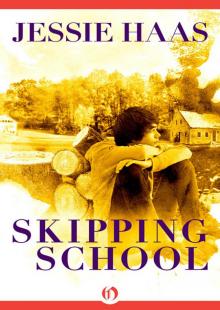 Skipping School
Skipping School Keeping Barney
Keeping Barney Unbroken
Unbroken Westminster West
Westminster West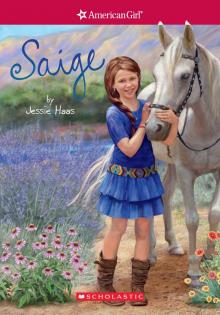 Saige
Saige Beware the Mare
Beware the Mare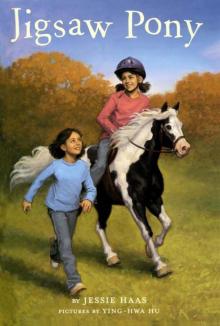 Jigsaw Pony
Jigsaw Pony Rescue
Rescue Saige Paints the Sky
Saige Paints the Sky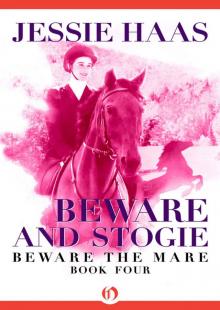 Beware and Stogie
Beware and Stogie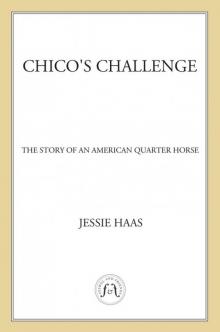 Chico's Challenge
Chico's Challenge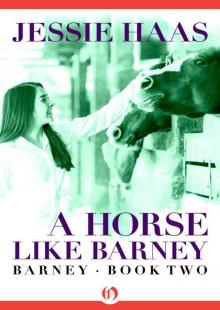 A Horse like Barney
A Horse like Barney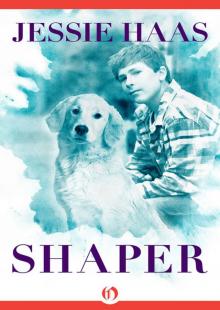 Shaper
Shaper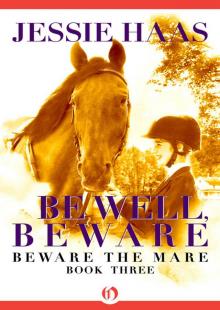 Be Well, Beware
Be Well, Beware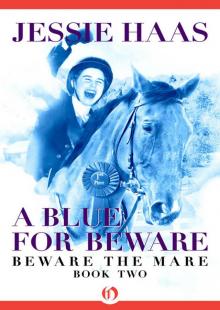 A Blue for Beware
A Blue for Beware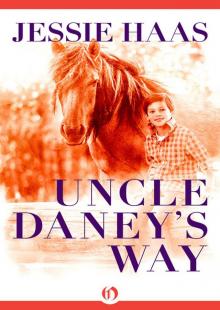 Uncle Daney's Way
Uncle Daney's Way